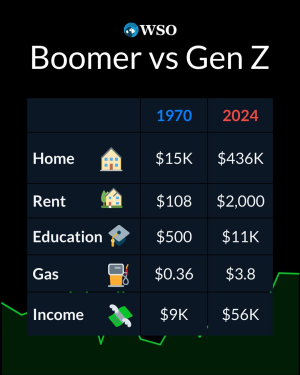Zoomer
Those who born in the '90s
"Generation Z and Late-Stage Capitalism: Navigating an Unbalanced Playing Field"
Generation Z, born in the '90s or known as Zoomers has come of age in a world shaped by Late-Stage Capitalism. With an inherent understanding of technology and information, they possess a unique perspective on the challenges they face. However, they find themselves in a system where resources and opportunities are concentrated in the hands of previous generations, leaving them to grapple with the consequences. This article delves into the realities of Generation Z's experiences and explores the emergence of the antiwork culture as a response to the pressures they encounter.
- The Rise of Late-Stage Capitalism:
Late-Stage Capitalism, characterized by wealth inequality, soaring housing prices, and stagnant wages, has created an uneven playing field for Generation Z. While previous generations enjoyed the benefits of affordable housing and stable employment, the youth of today face an uphill battle in securing their economic stability and achieving the same level of financial security. - Technological Savvy and Information Access:
Unlike previous generations, Generation Z grew up in an era of rapid technological advancement and easy access to information. They are well-versed in utilizing technology to their advantage, seeking alternative paths to success and finding innovative solutions to navigate an unbalanced economic landscape. - The Antiwork Culture and Tang Ping:
Faced with low wages and limited job prospects, Generation Z has embraced an antiwork culture characterized by the concept of "bai lan" or "let it rot." This passive-aggressive resistance movement challenges the notion that individuals must constantly strive for career success and material wealth. Tang ping, a related mindset of "lying flat," reflects a rational response to the difficulties of catching up with skyrocketing home prices and societal pressures. - Reclaiming Agency and Seeking Change:
Through their rejection of traditional notions of success and the pursuit of material wealth, Generation Z is asserting their desire for a more balanced and fulfilling life. They are questioning the system that perpetuates their struggles and demanding changes to societal structures that hinder their progress.
Conclusion:
Generation Z faces the unique challenges of Late-Stage Capitalism, which hinder their access to resources and economic stability. With their technological prowess and a growing antiwork culture, they are reshaping the narrative around success and seeking alternatives to the traditional paths. As they strive for a more equitable society, Generation Z is reclaiming their agency and paving the way for a future that goes beyond the constraints of Late-Stage Capitalism.
Why Zoomers can't handle high pressure jobs?
The notion that Zoomers struggle to handle pressure at work, exhibit a high turnover rate, and prefer easier jobs might be more nuanced than it appears at first glance. The landscape of work and career aspirations has been evolving, particularly among the younger generations. While some individuals within Gen Z might indeed lean towards seeking alternative ways to generate income and might be more sensitive to toxic work environments, it's important to avoid generalizations that oversimplify their motivations and actions.
Shifting Values and Priorities
The key factor in understanding this perspective lies in the changing values and priorities of the younger generation. Rather than solely valuing work for the sake of work or adhering to traditional career paths, many Zoomers prioritize financial stability and personal fulfillment. The traditional correlation between employment and stability has shifted for them. This doesn't necessarily mean that they shy away from pressure or responsibilities. Instead, they seek paths that provide both financial rewards and a sense of purpose.
"Quitting" as a Strategic Move
It's worth noting that for some, the concept of "quitting" isn't viewed as a sign of failure, but as a strategic move to explore new opportunities that align with their values and financial goals. The example of MoNoRi-Chan illustrates this well. His decision to leave a minimum wage job and return to Forex trading highlights his capacity to recognize and seize opportunities that offer better financial prospects and personal happiness.
The Rise of "Quiet Quitting"
The concept of "quiet quitting" can be seen as a strategy born out of adaptation and resilience. When faced with unfavorable conditions or inadequate recognition for their efforts, Zoomers are more likely to do "for what's money worth" or just bare minimum. With the introduction of the Internet, they can explore avenues where they can exercise their skills and have a more direct impact on their earnings. The shift towards personalized performance-based pay, such as in trading, can indeed provide a sense of autonomy and a stronger connection between effort and reward.
Beyond Generational Labels
Ultimately, rather than attributing these tendencies solely to an inability to handle pressure or a preference for easier jobs, it's essential to acknowledge the broader cultural shifts shaping the workforce. Gen Z's approach to work reflects a generation that values autonomy, meaningful work, and financial stability on their own terms. As with any generation, there is a spectrum of attitudes and motivations, making it crucial to approach the topic with a well-rounded understanding of the diverse factors influencing their decisions.
Remember, it's important to avoid generalizations about entire generations. While some Zoomers may struggle with pressure or prefer less demanding jobs, this is not true of all members of the generation. It's important to remember that individuals are complex and have a variety of reasons for making the choices they do.
Andrew Jackson's warning
From this article: Andrew Jackson and an Outrageous Crime Inflicted on the Next Generation
Andrew Jackson's prescient warnings about government deficits and the consequences of excessive money printing are more relevant today than ever before. As the government continues to expand its spending, future generations, including the hardworking individuals of Generation Z, are left to bear the burden of these mounting debts. It is disheartening to see how frivolous spending can leave a lasting impact on the economic prospects of the younger generation, who are already grappling with the challenges of Late-Stage Capitalism. The need for responsible fiscal policies and a focus on long-term sustainability is paramount to ensure a brighter future for the Zoomers and all those who will follow.
The staggering reality of the US federal debt serves as a poignant reminder of the consequences of frivolous spending and the impact it has on future generations. As Andrew Jackson, whose face adorns the $20 bill, once warned, the government's propensity to create a deficit through printing money can lead to dire consequences. Today, it is the zoomers and current workers who bear the burden of this astronomical debt, a weight that will persist for generations to come. It is crucial for us to be aware of the implications of such excessive spending and to hold our leaders accountable for their fiscal decisions. Let us strive for responsible financial management and a future where the economic well-being of the next generation is not compromised by the imprudent actions of the present.
Lying Flat on Chinese Gen Z people
When all the odds are rigged against you, why try and play the game the way they intended for you to lose?
Tang Ping: The Art of Not Playing a Rigged Game
In a world where hustle culture reigns supreme, where governments demand sacrificial productivity, and where the economy is more illusion than reality, some people have figured out the ultimate strategy:
Don’t play.
This is Tang Ping (躺平)—literally, "lying flat." It’s not laziness. It’s strategic disengagement. It’s recognizing that the system is built against you and deciding, "Nah, I’m good."
And nowhere is this defiance more evident than in China, where millions of young people have chosen to opt out entirely.
I. The CCP’s "Chinese Dream" Is a Rigged Game
For decades, the Chinese government has pushed the idea of the “Chinese Dream”—a promise that if you work hard, follow the rules, and dedicate yourself to the system, you’ll be rewarded with wealth, stability, and success.
But here’s the catch:
- The economy is built on overwork and exploitation.
- Housing prices are insanely high.
- Career opportunities are disappearing.
- Personal freedoms? Nonexistent.
At some point, you realize the "Chinese Dream" is just another corporate PR stunt—except at a national level.
The youth saw through the illusion and said, “Forget it. We’re out.”
II. Why Work When Everything Is Rigged?
The reality is brutal:
- There aren’t enough jobs. Youth unemployment in China hit record highs before the government conveniently decided to stop reporting it.
- Real estate is a mess. Developers built millions of overpriced, empty apartments. Now, even married couples divorce on paper just to qualify for government housing.
- The economy is slowing. Factories are shutting down, banks are closing branches, and entire sectors are in decline.
So why bother?
If working hard doesn’t get you anywhere, why not just Tang Ping?
III. The Financial Black Mirror: Digital Money & Crypto Bans
If you think the Western financial system is bad, imagine a world where:
- Your money isn’t really yours. It’s just a database entry in WeChat Pay or Alipay. The government can freeze, track, or erase it anytime.
- Crypto is banned. No escape routes. No alternative investments. Just whatever the CCP-controlled banking system allows.
- Cash is disappearing. The goal? Total financial control.
It’s like living in a dystopian video game where you have no ownership, no privacy, and no way out.
So what’s the logical response?
Lie flat. Stop contributing. Opt out.
IV. Tang Ping Is Not Losing—It’s Hacking the System
Western media loves to frame Tang Ping youth as failures, losers, or dropouts. But in reality, they’re just playing a different game.
Tang Ping is a refusal to be exploited.
- Why kill yourself for a 996 work schedule (9 AM – 9 PM, 6 days a week)?
- Why compete in an overcrowded job market just to make barely enough to survive?
- Why try to buy an apartment you’ll never fully own?
By choosing not to participate, they are breaking the cycle.
V. Some Are Choosing a Different Path—Thailand & Crypto Degeneracy
For some, Tang Ping doesn’t mean doing nothing—it means moving somewhere with better opportunities.
And where do many young Chinese go? Thailand.
- Lower cost of living. A decent life is actually affordable.
- Less government control. Sure, there’s corruption, but at least you won’t get arrested for Winnie the Pooh meme.
- More business freedom. Crypto isn’t banned, and cash still exists.
In China, crypto is forbidden. The moment you touch it, you're flagged as a financial dissident.
But in Thailand? You can be a full-time degen trader. And no one would give a fuck.
Why slave away in an office cubicle in Shenzhen when you can be shitposting on Twitter while flipping meme coins in Bangkok?
Some call it irresponsible.
Others call it escaping financial servitude.
VI. The Future: Will China Adapt or Collapse?
The CCP is terrified of Tang Ping. They’ve called it “dangerous” and “unpatriotic.”
Why?
Because a workforce that stops working is a nightmare for a hypercompetitive economy.
Their solutions?
- Promoting nationalism. "Work hard for China’s future!" (Yeah, sure.)
- Cracking down on alternative lifestyles. “Stop gaming, stop crypto, stop lying flat!” (Good luck enforcing that.)
- Encouraging marriage and childbirth. Because more workers = more economic output.
But young people aren’t buying it anymore.
China’s leadership has a choice:
- Adapt to reality—reduce work pressure, allow real financial freedom, and make life livable.
- Ignore the problem—and watch more young people either lie flat or leave.
Either way, the game is changing.
Tang Ping isn’t failure.
It’s resistance.
Zoomers vs The System
We are simply The Victims of a System we Didn't Create
Gen Z, the generation born between the mid-1990s and early 2010s, is facing a daunting challenge: a world shaped by the decisions of previous generations. While they inherit a technologically advanced world, they also inherit a system burdened by economic inequality, climate change, and a housing crisis.
One of the most significant challenges facing Gen Z is the rising cost of housing. As millennials before them, Gen Z is struggling to afford homes due to stagnant wages and skyrocketing property prices. The problem is exacerbated by a lack of affordable housing and the increasing dominance of corporate landlords.
A significant factor contributing to this crisis is the legacy of consumerism and debt. Generations X and Baby Boomers have normalized the use of credit cards to finance lifestyles beyond their means. This has led to a culture of overspending and debt accumulation, which has further inflated housing prices and made it harder for younger generations to save for a down payment.
Furthermore, the reluctance of older generations to retire has limited job opportunities for younger workers. Baby Boomers, facing rising healthcare costs and uncertain retirement prospects, are often forced to delay retirement, keeping younger workers from advancing in their careers.
The result is a system that is rigged against Gen Z. They are expected to pay off the debts of previous generations, while also facing the challenges of climate change and economic inequality. As they navigate this complex landscape, it is clear that they will need to find innovative solutions and advocate for policies that prioritize their needs and aspirations.
A Broken Social Contract: The Gen Z Dilemma
The social contract, an implicit agreement between generations, is under strain. Gen Z, the youngest generation, finds itself burdened by a system that seems designed to benefit older generations. Social Security, once a pillar of retirement security, is now facing a funding crisis. This puts the burden on younger generations, who are expected to pay into a system that may not be there for them.
The rising cost of living, particularly housing, has further exacerbated the financial challenges faced by Gen Z. Student loan debt, coupled with stagnant wages, has made it difficult for young people to achieve financial independence. As a result, many are turning to alternative paths, such as entrepreneurship and cryptocurrency investing, to secure their future.
Cryptocurrency, while risky, offers a degree of financial freedom that traditional systems cannot. With the ability to transact directly, without intermediaries, cryptocurrencies can provide a way to bypass the constraints of traditional finance. The rapid adoption of cryptocurrencies by younger generations reflects a growing distrust in traditional institutions and a desire for financial autonomy.
In conclusion, Gen Z is navigating a complex and uncertain future. As they grapple with the challenges of climate change, economic inequality, and social unrest, they are forced to question the fundamental assumptions of the system they inherited. By embracing innovation, challenging the status quo, and seeking alternative solutions, Gen Z may be able to forge a new path towards a more equitable and sustainable future.




